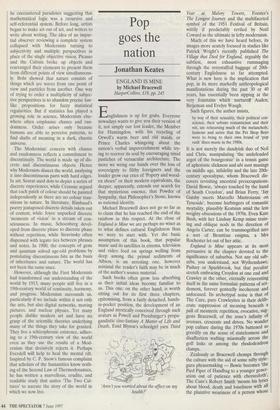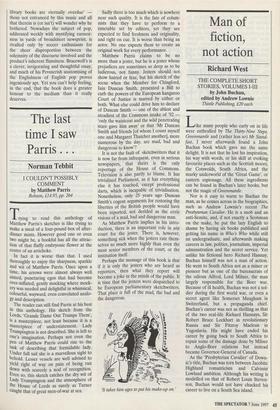Pop goes the nation
Jonathan Keates
ENGLAND IS MINE by Michael Bracewell HarperCollins, £18, pp. 245 Englishness is up for grabs. Everyone nowadays wants to give you their version of it, not simply our lost leader, the Member for Huntingdon, with his recycling of Orwell's warm beer and old maids, or Prince Charles whingeing about the nation's verbal impoverishment while try- ing to recover its soul by encouraging timid pastiches of vernacular architecture. The more we wring our hands over the loss of sovereignty to filthy foreigners and the louder grow our cries of 'Popery and wood- en shoes!' or their modern equivalents, the deeper, apparently, extends our search for that mysterious essence, that Powder of Sympathy, that Philosopher's Stone, known as national identity.
Michael Bracewell does not go so far as to claim that he has reached the end of the rainbow in this respect. At the close of England is Mine we are perhaps no wiser as to what defines cultural Englishness than we were to start with. Yet the basic assumption of this book, that popular music and its satellites in cinema, television and video feed on springs welling from deep among the primal sediments of Albion, is an arresting one, however minimal the reader's faith may be in much of the author's source material.
Such books often grow less absorbing as their initial ideas become familiar to us. This one, on the other hand, is worth sitting out for its first three chapters, epitomising, from a fairly detached, hands- in-pocket position, the development of an England mystically conceived through such avatars as Powell and Pressburger's propa- gandistic cine-fantasy A Matter of Life and Death, Enid Blyton's schoolgirl yarn Third 'Aren't you worried about the affect on my health?' Year at Malory Towers, Forster's The Longest Journey and the multifaceted symbol of the 1951 Festival of Britain, wittily if predictably reviled by Noel Coward as the ultimate in lefty modernism.
Much of this we have heard before, its images more acutely focused in studies like Patrick Wright's recently published The Village that Died for England, arguably the subtlest, most exhaustive rummaging through the overstuffed baggage of 20th- century Englishness so far attempted. What is new here is the implication that pop, in its more markedly anthropological manifestations during the past 30 or 40 years, has essentially been sipping at the very fountains which nurtured Auden, Betjeman and Evelyn Waugh.
Such figures, the author insists,
by way of their sexuality, their political con- science, their urbane romanticism and their wit, are rehearsing much of the melancholy, humour and satire that the Pet Shop Boys were to bring to their own brand of 'pop rush' disco music in the 1980s.
It is not merely the dandyish duo of Neil and Chris, manipulating 'the undefended argot of the bourgeoisie' in a tennis game of aphoristic slickness and ubi sunt musings on middle age, infidelity and the late 20th- century apocalypse, whom Bracewell dis- covers revisiting ancestral preoccupations. David Bowie, 'always touched by the hand of South Croydon', and Brian Ferry, 'Jay Gatsby meets Marcello Mastroianni on Tyneside', become harbingers of romantic mortality, plausibly ICeatsian amid the less weighty obsessions of the 1970s. Even Kate Bush, with her Lindsay Kemp mime train- ing and oblique nods in the direction of Angela Carter, can be transmogrified into a sort of Brontean enigma, a Mrs Rochester let out of her attic.
England is Mine appears at its most persuasive in the chapter devoted to the significance of suburbia. Not any old sub- urbs, you understand, not Wythenshawe, Pudsey or Sparkbrook, but that peculiar stretch embracing Croydon at one end and Crawley at the other, eternally reinventing itself in the same formulaic patterns of set- tlement, forever genteelly incoherent and unfocused. Its archetypal noise is that of The Cure, pure Crawleyites in their delib- erate suppression of meaning beneath a pall of mesmeric repetition, evocative, sug- gests Bracewell, of the zone's infinity of avenues, crescents and drives. No wonder pop culture during the 1970s battened so greedily on the sense of statelessness and disaffection wafting miasmally across the golf links or among the rhododendron clumps. Zealously as Bracewell chomps through the culture with the aid of some nifty style guru phrasemaking — Bowie becomes 'the Pied Piper of Handbag to a younger gener- ation out of patience with cheesecloth, The Cure's Robert Smith 'moans his lyrics about blood, death and loneliness with all the plaintive weariness of a person whose library books are eternally overdue' — those not entranced by this music and all that therein is (or isn't) will wonder why he bothered. Nowadays the subject of pop, addressed weekly with mystifying earnest- ness in yards of broadsheet newsprint, is rivalled only by soccer enthusiasm for the sheer disproportion between the solemnity of the discourse involved and the product's inherent flimsiness. Bracewell's is a clever, invigorating and thoughtful essay, and much of his Pevsnerish anatomising of the Englishness of English pop proves ingeniously apt. Yet you can't help feeling, in the end, that the book does a greater honour to the medium than it really deserves.











































































 Previous page
Previous page